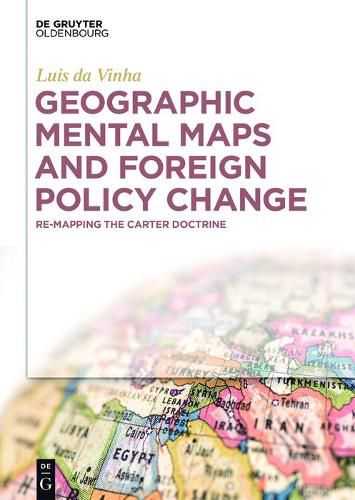Readings Newsletter
Become a Readings Member to make your shopping experience even easier.
Sign in or sign up for free!
You’re not far away from qualifying for FREE standard shipping within Australia
You’ve qualified for FREE standard shipping within Australia
The cart is loading…






This title is printed to order. This book may have been self-published. If so, we cannot guarantee the quality of the content. In the main most books will have gone through the editing process however some may not. We therefore suggest that you be aware of this before ordering this book. If in doubt check either the author or publisher’s details as we are unable to accept any returns unless they are faulty. Please contact us if you have any questions.
In recent years geographic mental maps have made a comeback into the spotlight of scholarly inquiry in the area of International Relations (IR), particularly Foreign Policy Analysis (FPA).
The book is framed within the mental map research agenda. It seeks to contribute and expand the theoretical and empirical development and application of geographic mental maps as an analytical concept for international politics. More precisely, it presents a theoretical framework for understanding how mental maps are employed in foreign policy decision-making and highlights the mechanisms involved in their transformation.
The theoretical framework presented in this book employs the latest conceptual and theoretical insight from numerous other scientific fields such as social psychology and organizational theory.
In order to test the theoretical propositions outlined in the initial chapters, the book assesses how the Carter Administration’s changing mental maps impacted its Middle East policy. In other words, the book applies geographic mental maps as an analytical tool to explain the development of the Carter Doctrine.
The book is particularly targeted at academics, students, and professionals involved in the fields of Human Geography, IR, Political Geography, and FPA. The book will also be of interest to individuals interested in Political Science more generally. While the book has is academic in nature, its qualitative and holistic approach is accessible to all readers interested in geography and international politics.
Luis da Vinha, PhD, is Assistant Professor of Geography & Political Science at Valley City State University.
$9.00 standard shipping within Australia
FREE standard shipping within Australia for orders over $100.00
Express & International shipping calculated at checkout
This title is printed to order. This book may have been self-published. If so, we cannot guarantee the quality of the content. In the main most books will have gone through the editing process however some may not. We therefore suggest that you be aware of this before ordering this book. If in doubt check either the author or publisher’s details as we are unable to accept any returns unless they are faulty. Please contact us if you have any questions.
In recent years geographic mental maps have made a comeback into the spotlight of scholarly inquiry in the area of International Relations (IR), particularly Foreign Policy Analysis (FPA).
The book is framed within the mental map research agenda. It seeks to contribute and expand the theoretical and empirical development and application of geographic mental maps as an analytical concept for international politics. More precisely, it presents a theoretical framework for understanding how mental maps are employed in foreign policy decision-making and highlights the mechanisms involved in their transformation.
The theoretical framework presented in this book employs the latest conceptual and theoretical insight from numerous other scientific fields such as social psychology and organizational theory.
In order to test the theoretical propositions outlined in the initial chapters, the book assesses how the Carter Administration’s changing mental maps impacted its Middle East policy. In other words, the book applies geographic mental maps as an analytical tool to explain the development of the Carter Doctrine.
The book is particularly targeted at academics, students, and professionals involved in the fields of Human Geography, IR, Political Geography, and FPA. The book will also be of interest to individuals interested in Political Science more generally. While the book has is academic in nature, its qualitative and holistic approach is accessible to all readers interested in geography and international politics.
Luis da Vinha, PhD, is Assistant Professor of Geography & Political Science at Valley City State University.